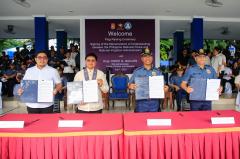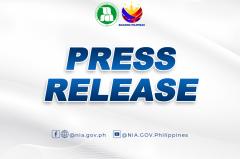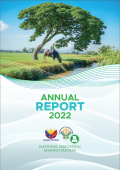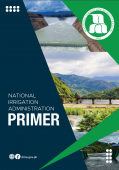National Irrigation Administration (NIA) chief Claro V. Maranan has conceptualized and formulated the guidelines and principles of his Seven Point Program that he earlier introduced upon assuming his post as administrator to outline the agency's immediate course of action on various aspects of organizational and operational performance.
The objectives of the said program are the following: 1. Provide creative and speedy solutions to the urgent problems confronting NIA; 2. Rally the support of employees and officers in carrying out the Change plan and 3. Document the program for future reference as a learning organization committed to continuing improvement.
The program is consistent with President Aquino's vision of the Philippines which depicts a country with transformational leaders, a government dedicated to honing and mobilizing people's skills and energies as well as the responsible harnessing of natural resources, and the value for excellence and integrity.
First is RAPID AND EFFICIENT DELIVERY OF IRRIGATION PROJECTS to fast-track project implementation through: 1. Skills Enhancement or additional training and seminars for members of the engineering staff, Bidding and Awards Committee and Technical Working Groups; 2. Decentralization to increase the Regional field offices' authority, easing the Central Office of other activities to speed up project preparations; 3. Taking a proactive stance in the procurement activities in the last quarter of the current year allowing projects to start in the first quarter of next year; 4. Establishing Pipe-line Projects as basis of Project Identification and Prioritization to minimize problems; 5. Adoption/Execution of Irrigation Process wherein beneficiaries/users are involved in the various project cycles; 6. Establishing a Project Monitoring and Evaluation System or implementing calibrated action on projects with negative slippages and blacklisting of undesirable contractors; 7. Review of MOA with LGUs existing policy shall be conducted to include criteria on technical capacity of LGUs and 8. Geo-Tagging or using computers and digital technology to identify project locations.
Second is ACCURATE REPORTING AND MONITORING SYSTEMfor consistency, reliability & accuracy of data and to obtain efficient data management through: 1. Establishing Baseline Data by existing Management Information Department (MID) to rectify and update programs currently implemented by the agency; 2. Adopt Standard Monitoring Format for simple consolidation and to avoid confusion if report is not updated; 3. Create Monitoring Team for the monitoring and evaluation from data gathering, collation, analysis, monitoring and evaluation; 4. Strengthen On-line Data Management to facilitate faster and more precise encoding, processing and access of data; 5. Parcellary Mapping of Irrigation Service Areas to define actual service areas and regular update of master list of farmers in coordination with Irrigators Associations.
Third is ORGANIZATIONAL REFORMS AND PROCESS INNOVATIONS to achieve a lean but strong, sustainable and financially-efficient organization through: 1. Conduct Strategic Planning to create new mission and vision for the agency and encourage employee commitment; 2. Implement the Strategic Performance Monitoring System (SPMS) to optimize productivity of personnel; 3. Enhance Human Resource Development through include training needs assessment, Career Path Plan, succession planning/mentoring and Office Utilization Plan and 4. Intensify Public Relations to restore the corporate standing of the Agency.
Fourth is CORPORATE FINANCIAL STABILITY. Because the NIA is a Government-own and Controlled Corporation, it seeks to generate income through: 1. Improve targeting, collection and remittance of Irrigation Service Fee (ISF); 2. Generate additional income from sales of non-performing assets, rental of facilities and equipment; 3. Implement and program mini-hydro power plants and domestic water system to include review of existing contracts on power generation; 4. Amend existing contracts on power generation with consideration on the value of infrastructures and facilities used; 5. Enforce austerity measures (AO 103, MC 9, 2005); and 6. Centralization of funds under a Common Basket Policy.
Fifth is EMPOWERMENT AND CONTINUOUS LEARNING FOR EMPLOYEES where the administrator consulted with the employees Union and agreed to fully implement the provision of the approved Collective Negotiation Agreement (CNA) and has tasked the Union to tasked to draft programs to further empower employees and for the Union to serve as watchdog of the Agency. Other forms of empowerment are providing NIANS with all benefits due to them and partnering them in livelihood programs with farmers.
Sixth is COMPREHENSIVE PLAN ON CLIMATE CHANGE ADAPTATION to reduce impact of climate change on irrigation facilities/structures, water availability and the irrigation environment due to erosion, run-off, and flooding, it intends to pursue the following programs: 1. Climate proofing of irrigation structures through adoption of alternate and improved design; 2. Adoption/observance of Sustainable Agriculture & Water Saving Technologies; 3. Pioneer sustainable Tree Planting Program maintenance on water- shed; 4. Enforce energy conservation and 5. Formulate Program for Dam Assessment and Maintenance.
Seventh is BUILD STRONGER COMMITMENT TO FARMERS AND OTHER STAKEHOLDERS where the Agency visualizes a strong commitment to farmers for a lasting cooperation, understanding and partnership in irrigation development as well as improve the participation of Irrigators Association in project implementation and in the operation & maintenance of irrigation systems and to show total commitment to the IA for an administration of good governance and transparency, the following will be implemented: 1. Adopt and internalize the Department's Irrigation-Based Development Approach, a bottom-up approach in rice industry development; 2. Encourage Farmers Participation in Project Monitoring; 3. Continue to support Institutional Development Program of Farmer-Irrigators and 4. Provide livelihood projects to the farmers (Aquaculture, Tourism). The Institutional Development Program (IDP) shall continue to be active in creating a functional and dynamic Irrigators Association.
"The old, ineffective structures will be transformed into innovative systems and processes responsive to the demands of the NIA and stakeholders. Taking full responsibility for results, the next ten years of NIA will be its greatest decade ever," Administrator Maranan said.

















